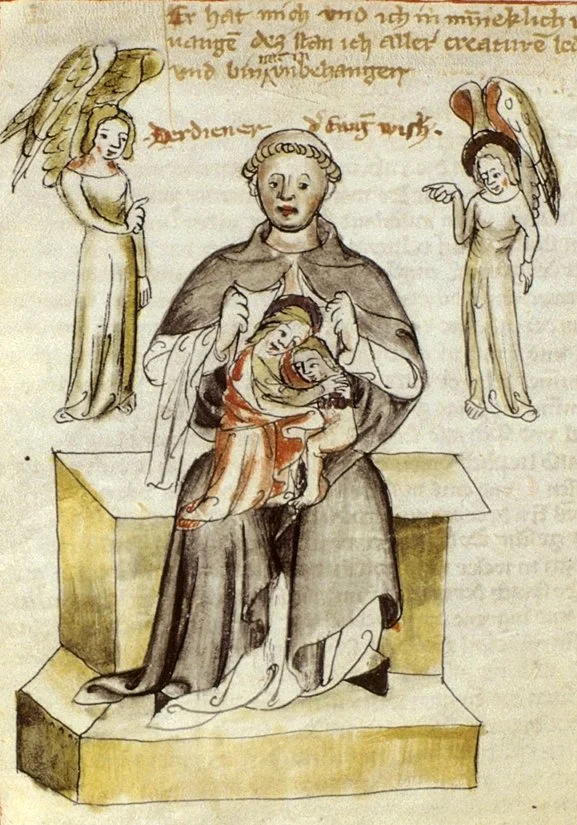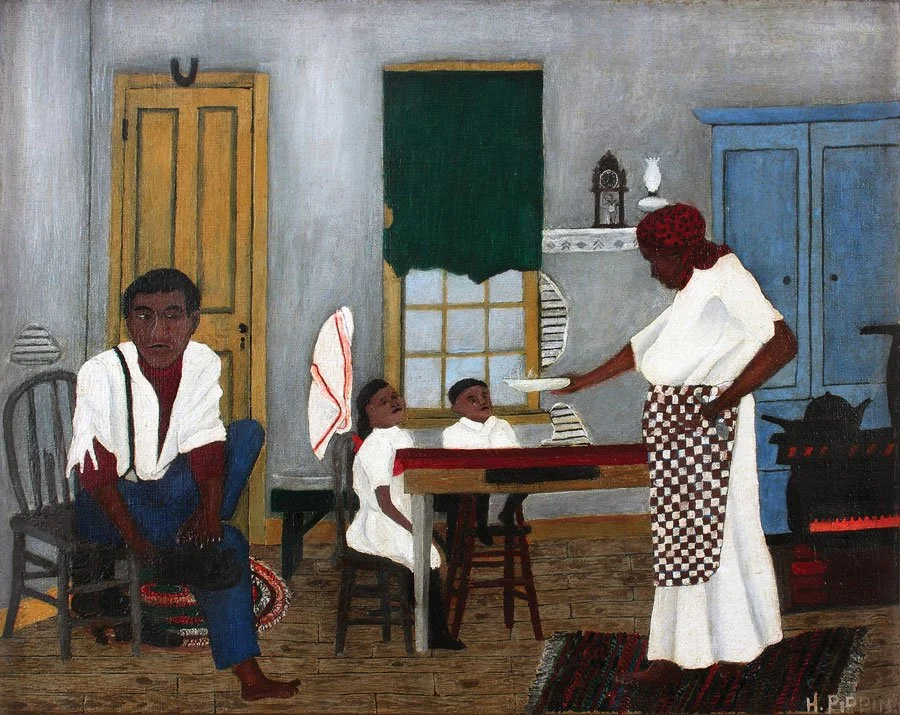Apple Harvest, The Mystic’s Table Manners, Doing Good
A Sermon Preached by The Rev. Evan Graham Clendenin,
9th Sunday After Pentecost, 8/10/25,
Episcopal Church of the Holy Spirit, Vashon Island WA
Lectionary Texts: Isaiah 1:1, 10-20 Psalm 50:1-8, 23-24 Hebrews 11:1-3, 8-16 Luke 12:32-40
If you really want to learn to do good table manners, you should go see Henry Suso. If you want to learn good, go visit that mystic and saint, sit at his table, and see how he gave thanks. If you want to learn to do good, and to make an offering of thanks to God, simply sit down with Sweet Henry.
You would see how he prepared his food, and gave thanks, and welcome others at table. You’d see how he cut and enjoyed apples. And that might be a welcome little detail, given the overflowing apple harvest we can see this summer and fall. The trees in my neighborhood are loaded, and I can see the trees here on Vashon are cascading with apples and other fruit. And I know quite a few of you are orchardists.
So, Henry Suso was a Dominican brother, a variety of monk. Other Dominicans you may have heard of include Albert the Great, and his students, Thomas Aquinas and Meister Eckhart. Suso was a student of Eckhart. They were an order devoted especially to preaching and teaching. Henry Suso preached and taught along the Rhine river. Also, fun fact, his name Suso, is a variant of the word that means ‘Sweet’ in German. Suess or Siess. Heinrich Siesi. Sweet Henry.
He loved God, and felt things deeply, and he sought intense experiences and expressions of his desire for God, as he understood God at that time. Earlier in his life, as a young adult, he took this passion to rather gruesome medieval extremes. Long hours praying in uncomfortable positions, starving himself, sleeping little. He even got this great idea to sew tacks into his undershirt, in order, so he thought, to learn to suffer with Christ. His biographer didn’t think this was very good.
Henry also came to realize his extreme devotional contrivances were not good. Some of his study and devotion had been good, helped him to learn and mature, gain discipline, and guide his loving energies more truly to God and neighbor as himself. But it was time to out-grow some of these, and some, God had never wanted.
And Henry began to realize God saying something like: reality, reality itself would offer him plenty of ways to join in Christ’s suffering. Rough treatment and danger on the road, false accusation and betrayal by friends, sickness, failed harvests. Government contrived famines and land seizures. Feudal pretenders seeking authoritarian breakthrough thru corruption, cruelty and perception manipulation. …You all know what I’m talking about!
You don’t need to contrive sufferings, the world will bring more than enough. It’s less about the external suffering, and more about your inner presence to bear more of the suffering you and others face. The question is whether you face these sufferings of others and yourself with an inner freedom that lets your be with love, and act out of love and courage, a persistent and focused desire to do good ‘for the long haul’, to offer the substance of your life, despite it all, in thanks to God. God changes us inside, in ‘the heart.’
And it’s in simple activities of daily living, like how we prepare and share food at table, that a heart transformed by God is demonstrated. Henry loved apples, but earlier in life he would deny himself apples because he thought his enjoyment of the fruit was a sinful desire. Around that time, the apple harvest failed in the region. And something shifted in him, in his regard toward his desire for apples, in how he could see that God met him in his desires and his own being and in others. He prayed to God saying, ‘God if you want me to enjoy apples, please provide enough for all the community to enjoy them too.’
And wouldn’t you know, not much later, a noble stranger came by to eat with the brothers, and left them a nice big silver coin, enough to buy a whole crop of apples for the brothers to enjoy. So Henry enjoyed apples as a gift of God. He would take an apple and slice it into four pieces. Three he would peel, to remind himself of the holy trinity, one we would leave unpeeled, and in appreciation of the fact that children at the time ate their apples unpeeled, and we might become as little children. (I know the peel is the most healthy part, we could tell him that now.) And he greeted and welcomed God at every meal, offering the Holy Wisdom food and drink, attending to them in gentleness and welcome.
Sunday Morning Breakfast, Horace Pippin, 1943, Public Domain via Wikimedia Commons
There come moments when we what we had thought we needed to do to get near God falls apart and flakes away. A devotion, a study, an ideal, some practice, habit, or ritual, some belief taught or caught by life, upbringing, education, the pressures of life, or one’s own false self pursuits…you come to find these are not what God wants. Isaiah and the Psalmist speak to this…
“I am weary of your offerings”
“Do you think I actually like the blood of goats?”
In such moments you may discover that the God of your understanding, your inner picture of the holy one, is undergoing subtle, and not so subtle, changes. Such movements and changes in our faith transform us, make our worship and prayer more truly a sacrifice that is ‘reasonable, holy and living’, - a practice of everyday gratitude and simple, persistent doing good.
And God gives us a Holy Spirit assist, a silver coin when we need it. The master will come and serve them, us, at his table, says Luke today. And we receive again the chance to learn to do good, and to give thanks to God, in worship, and prayer, and in all of life as we live it a day at a time.



